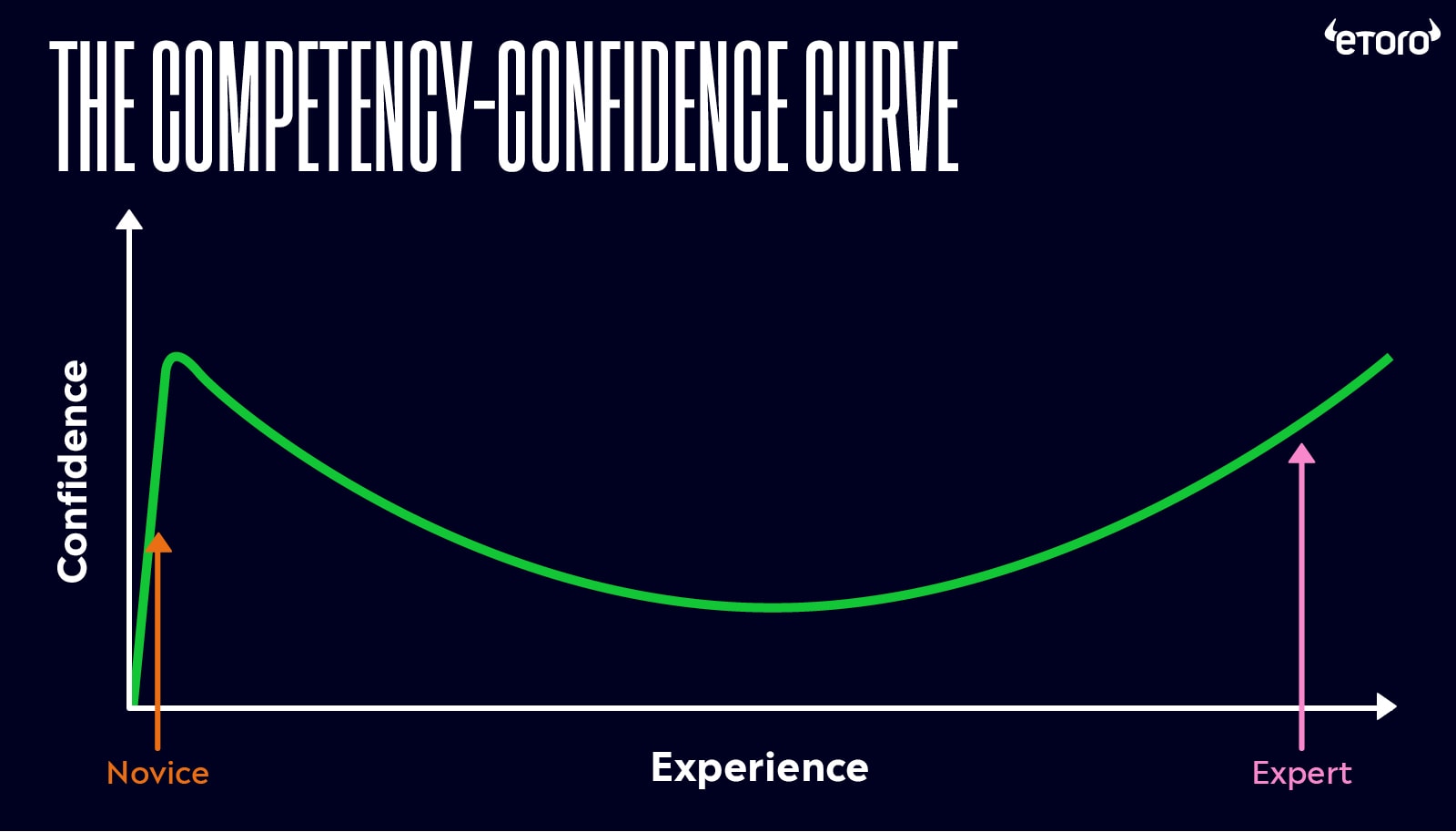We all like to focus on where markets will go next.
But often, the key to investing success lies in your confidence.
You can do all the research you want on what to buy or sell, but none of it matters unless you’re able to confidently make the right decisions for your portfolio. Too much confidence has led even the best investors into dangerous territory, leading to some infamous portfolio meltdowns from risky trades.
And if you fall somewhere in the middle, you’ve probably felt doubt creep in from time to time. Are you investing your money in the best way possible? That’s a lot of pressure, and doubt can turn into mistakes.
Dunning-Kruger and You
We all struggle with our confidence, whether we admit it or not. It’s a natural part of growing and learning. There’s even a researched relationship between competence and confidence that explains why we initially feel like masters of the universe when we start learning about something, then quickly get overwhelmed as we dig deeper. It’s the Dunning-Kruger Effect, a cognitive phenomenon in which your confidence tends to decline as you get more familiar with something.

If you’re a new investor, this learning curve may feel all too familiar. You’ve likely experienced some dramatic highs and lows already. In the first 12 months of the COVID recovery, stocks, bonds, crypto and gold were noticeably higher. Now, the tables have turned, and all are down so far this year. If you’re holding more trendy stocks, you’ve probably felt even more pain.
On top of that, you’re likely wading through the middle part of the competency-confidence curve, and you may be asking yourself why you even invested in the first place. Fear and uncertainty are gripping even the most experienced investors, so it makes sense that you’re overwhelmed.
Boosting Your Confidence
Try not to let this awful year rattle your confidence, though.
If your confidence has taken a hit, here are a few ways to get your investing mojo back:
Remember your runway.
If you’re investing for a long-term goal years down the road, you may be able to withstand more volatility than you think. Time can be a powerful antidote to market selloffs, thanks to the phenomenon of compounding. If you’re investing over many years, your ideal investment strategy may just be to consistently make an average return instead of going big then flaming out.
Lean into change.
Markets move in mysterious ways. What works today may not work tomorrow. Take a look at this chart of the best-performing markets over the past 10 years.

Different investments tend to do well each year because of economic conditions, the political climate, interest rates, and unforeseen events. Sometimes, the best performers don’t make much sense.
Try not to go all in on one asset class. That’s a bold move, and it may backfire on you. Think about rebalancing — or taking money out of a well-performing market and adding it to another underperforming asset to even out risk.
Try what you know.
The smartest investors know their strengths and weaknesses. Legendary investor Warren Buffett frequently preaches about the “circle of competence” theory, or the exercise of investing in assets and sectors you know best. You may feel like a rookie, but investing in what you know could make you feel more comfortable.
Check yourself…
Before you wreck yourself. Seriously, make a habit of checking the blind spots in your portfolio. Be honest: can your investments handle another big selloff? Do you understand the risks that you’re taking on? Do they align with your goals?
Keep at it.
If you check out, you may miss opportunities to grow your portfolio and reach your goals. Saving cash is a good habit, but at a certain point, you may have to take some risks to put your money to work and potentially fight inflation.
Markets go through difficult, seemingly insurmountable stretches from time to time. It’s tough to stay engaged, but remember: when you’re uncomfortable, you’re growing.
Don’t get jaded.
While the Great Financial Crisis was a big blow to confidence, the S&P 500 embarked on one of the longest and strongest bull markets in history. Bitcoin has had an incredible run over the past 10 years, but it’s also gone through a 20% selloff every six months on average. The world felt like it was ending in March 2020, and well, you know what happened next.
Above all, remember that it’s not just you who struggles with this investing thing. Nobody has the markets figured out, and many of the pros haven’t even mastered their egos. But don’t let your confidence keep you from being your best financial self.
*Data sourced through Bloomberg. Can be made available upon request.

